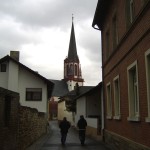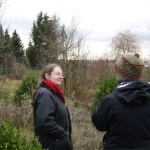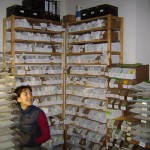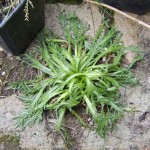From Switzerland we traveled back north up to Germany for a visit with Ulla Grall of Bio-Saatgut. The name of her company says it all: “Organic Seeds”. Ulla offers through her catalog seeds that she produces herself and those grown by several small contract growers, as well as seeds from Sativa Rheinau and a French seed company called Ferme de Sainte Marthe. Ulla told us she wants to grow more of her own seed herself, but also takes pride in the fact that she offers seeds from two other countries. Because of the EU seed laws it is difficult for many people to order seeds from other countries, or they simply don’t think of it as an option. Through her seed company, Ulla offers many varieties that would otherwise be unavailable to German gardeners.



R to L: On the streets of Armsheim, Ulla grall in her garden, more of her gardens.
Ulla became involved in seeds initially as a translator and marketer for Ferme de Sainte Marthe in Germany more than a decade ago when the company was trying to expand into the German market. After Ferme abandoned this project, Ulla took on selling some of their varieties personally. What began as a small mail order resale company has since blossomed into one of the only independent organically certified seed companies in Germany.
For years, Ulla Grall’s garden was the smallest Organically Certified piece of land in all of Germany, but this is no longer her claim to fame, as an organic nurseryman has taken that title.


L to R: Ulla’s Seeds, Elkhorn Plantain.
We stayed Ulla and her husband Gerhard for a short weekend towards the end of January, and talked seeds and swapped seeds as we tend to do. She told us of her involvement in the Bantam Mais project, as she was one of the suppliers for the Greenpeace initiative to get people growing open-pollinated sweet corn. When someone registers an open-pollinated planting of a crop such as mais, German coexistence laws prevent the government from granting people permits for Genetically Modified plantings in the same area. The Co-existence laws in Germany prevent GMO corn from being planted within 500 meters of an open-pollinated planting. Ulla Grall was one of the seed companies (along with Bingenheimer and the German Seed Saver’s organization, VEN), where people could write in and request free corn seeds.
Ulla is working with other certified organic farmers and gardeners to produce seed for Bio Saatgut, and would be very interested in working with more contract growers. But so few people are skilled in seed saving and seed production that it often takes contract growers several years before they are producing enough for her needs. We had the pleasure to meet one such skilled seed producer by the name of Martin, a German that has been farming in Hungary for some years now. He was visiting Ulla to deliver some seeds he had grown for her, and also to share some premium paprika powder that he had grown. Martin took some of our seeds back with him to Hungary, and is especially excited to try to produce broccoli seed from the NutriBud we gave him. Most of his non-seed crops are sold to processors, and he showed us photos of huge sacks of red peppers being loaded onto large trucks, to be pickled or frozen or added to ready-made meals. Martin told us he would like to transition to growing more seeds, and doing more direct marketing, but he said you can’t do it all. A few weeks after meeting him, we received via post 30 varieties of Hungarian peppers and other interesting cultivars, five of which were from his own seed saving.
On Sunday we went with Ulla and Gerhard to a brunch of regional Organic farmers, at a beautiful farm not far from her home. There we feasted on delicious food and learned about what some other organic farmers were up to. The farm that we visited was the home of a regional organic apple juice factory, and in addition to several flavors of juice for market, the juicery also offered the service of juicing other people’s apples and pears. In addition, they had several large teepees that are available for people to camp out in during the summer, as well as lots of cows and field crops. It struck us how many young families were at the brunch, and thought this might be representative of the amount of young families involved in organic agriculture in Germany. I commented on how hard it must be for them to support their families with farming. Someone answered that they don’t — the taxpayers do. As we found elsewhere in Europe, subsidies amount for a large part of farmers’ incomes, and organic farmers sometimes receive more subsidies than their conventional counterparts. This is quite different from the situation in the US, where there are no subsidies that I know of for Organic growers.
Our time with Ulla wound up being much more than we had expected — what we had anticipated to be a short visit with a small seed company turned in to so much more, as we met with organic farmers from western Germany as well as Hungary. This visit gave us some insight into the organic farming and seed scene in Germany, which is quite different from the biodynamic scene we had been exposed to up to this point. Despite the many differences, both communities recognize the urgency needed to engage people with open-pollinated seeds, and are working to that end.
Leave a Reply